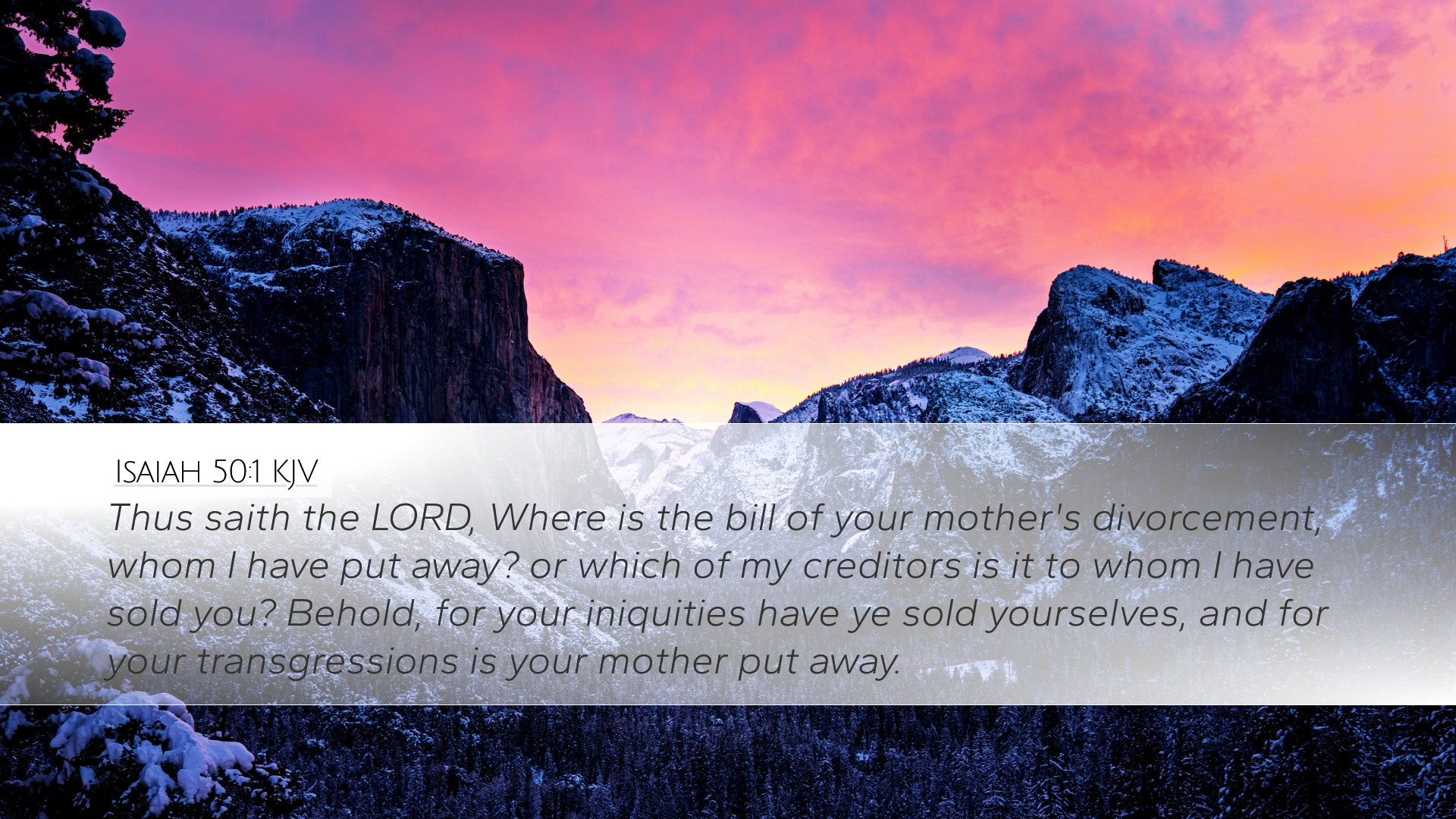Commentary on Isaiah 50:1
Isaiah 50:1 states: "Thus says the Lord: 'Where is your mother's certificate of divorce with which I sent her away? Or which of my creditors is it to whom I have sold you? Behold, for your iniquities you were sold, and for your transgressions your mother was sent away.'
Introduction
This verse is a striking reminder of God's relationship with His people, particularly Israel. It addresses themes of judgment, redemption, and the covenant nature of God's dealings with humanity. In examining this verse, we will draw insights from notable public domain commentaries including Matthew Henry, Albert Barnes, and Adam Clarke.
Contextual Background
Isaiah, a prophet active in Judah during the 8th century BCE, conveys messages of both impending judgment and future restoration. This passage falls within a broader section that outlines Israel’s spiritual condition and the consequences of their actions.
Analysis of the Verse
Divine Challenge
Matthew Henry highlights the rhetorical nature of God's questioning. God challenges Israel to recognize their current state. The metaphor of divorce and sale emphasizes abandonment and disillusionment. Henry elaborates that these metaphors are meant to awaken Israel from complacency regarding their sins, acting as a call to repentance.
The Certificate of Divorce
Albert Barnes notes the significance of the "certificate of divorce." This symbolizes a formal acknowledgment of abandonment, signifying a legal separation grounded in the infidelity of Israel towards God. He asserts that God had not arbitrarily divorced Israel but rather was responding to their persistent rebellion.
The Question of Creditors
Adam Clarke interprets the mention of creditors as a metaphor for the consequences of sin. Clarke explains that just as an individual may be sold into servitude to repay debts, the people of Israel were given over to the consequences of their actions. This aligns with the broader biblical theme of reaping what one sows.
Theological Implications
Covenantal Faithfulness
The verse raises critical questions about God’s faithfulness versus human unfaithfulness. The language used implies that while God remains steadfast, it is the people who have deviated from their covenant commitments. This resonates with the overarching theme of covenant theology where God's promises are unchanging.
The Nature of Sin and Judgment
Here, sin is viewed as both a personal and communal issue. Matthew Henry reflects on the idea that collective guilt results from individual actions, echoing the principle of corporate responsibility. God's inquiry serves to confront the nation with their moral decline, which he hopes will lead them to a place of genuine contrition.
Hope for Restoration
Though judgment is a prevailing theme, Barnes points towards the underlying hope for restoration. Even in their current tragic state, the assurance remains that God seeks a reconciliation process. This verse, while severe, is a reminder of God’s ongoing desire to redeem and restore His people.
Practical Applications for Today
- Understanding God’s Love: Recognizing that God’s judgments often stem from love, aiming to guide us back to Him.
- The Importance of Repentance: Encouraging personal and communal reflection on loyalty to God's precepts, emphasizing repentance as a path to renewal.
- Viewing Suffering in Context: Understanding that trials may not simply be punitive but a means to restore and strengthen faith.
Conclusion
Isaiah 50:1 serves as a sobering reminder of the consequences of unfaithfulness toward God but also points to His enduring grace. Through the lenses of Matthew Henry, Albert Barnes, and Adam Clarke, we see a profound invitation to comprehend the seriousness of sin and the opportunities for repentance and restoration. It urges scholars, theologians, and believers alike to engage deeply with the text, seeking both understanding and transformation.


